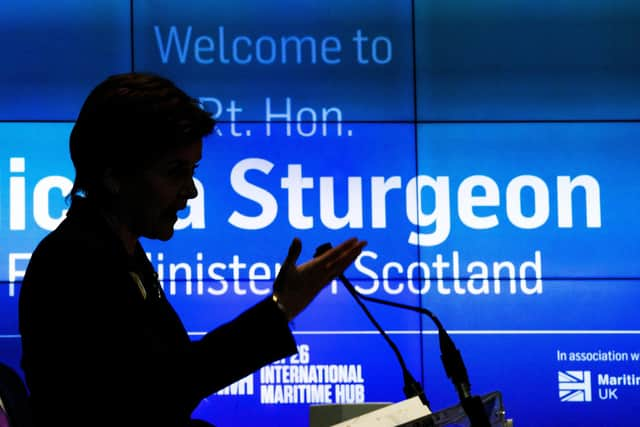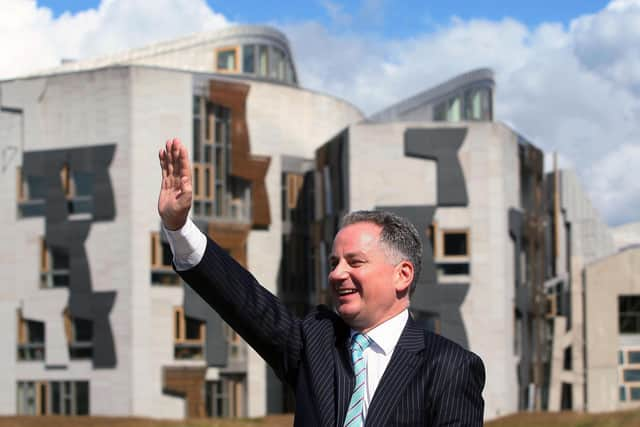Scotland is stuck and only Nicola Sturgeon can unstick it - Euan McColm
The feeling was, I recall, mutual. Away from the frontline, with all its mock outrage and skullduggery, McConnell - now a member of the House of Lords - and Sturgeon had a good and productive relationship.
And so, I suspect, the First Minister will have found an interview McConnell gave to Holyrood magazine last week to make deeply uncomfortable reading.
Advertisement
Hide AdAdvertisement
Hide AdAngry, frustrated and - at times - tearful, McConnell told the magazine the national obsession with the independence issue had stymied debate and action in
other areas. What's more, he went on, there was scant hope of this situation changing.
Scotland, said McConnell, is “stuck”. Since the aftermath of the 2014 referendum, the country remains as it was; the pandemic aside, almost nothing has changed.
It’s difficult to disagree with McConnell’s assessment. Since succeeding Alex Salmond as First Minister more than seven years ago, Sturgeon has made holding a second referendum a priority. Actually, it may be more accurate to say she has made talking about holding a second referendum a priority.
Ignoring the obstacles in her way - polls showing a narrow majority of Scots remain in favour of the maintenance of the United Kingdom, the loss of the SNP’s majority at Holyrood, and - not least - the fact she has no legal authority to actually run another vote on the constitutional question, Sturgeon has repeatedly told her supporters another referendum is imminent. This one-last-heave-lads approach to the independence issue may have energised SNP supporters but it has also removed focus from other policy areas.


A few years ago, former Justice Secretary Kenny MacAskill blew the whistle on the SNP’s approach to government. Writing in a pro-independence newspaper, he explained the Scottish Government of which he was part had decided not to permit prisoners to vote not because it believed this was the right decision, but because it feared to do otherwise might create a public backlash, damaging the independence campaign.
The prioritisation of the project above all else continues under Sturgeon. Shamelessly populist policies such as extending the provision of free prescriptions to the wealthy are easy to enact and low risk. Reform of the National Health Service or the education system, on the other hand, is fraught with danger.
The SNP avoids the pitfalls ahead by standing still. And while the SNP stands still, so does Scotland.
Advertisement
Hide AdAdvertisement
Hide AdUnsurprisingly, many treated McConnell’s words with disdain. On binary hate-site Twitter, he was dismissed as an irrelevant “Yoon” whose words could be ignored. Who was this unelected Lord to tell Scots anything?


But those critics would struggle to counter McConnell’s assessment that “all we are doing is waiting for the next referendum”.
Another referendum is seen by some activists on both sides of the constitutional debate as the only way to settle the matter, once and for all. This is naive. If, as polls suggest they would, Scottish nationalists lost a second independence referendum, then we could be certain that we’d soon hear that another vote was needed to settle the matter, once and for all. Right now, a second referendum would merely confirm that Scotland is divided.
This obsession with the independence question, said McConnell, had created a lack of political accountability in Scotland. If someone comments - positively or negatively - about either the Scottish or UK Governments or about any public service or legislation or issue, their remarks are immediately categorised by where they are perceived to stand on the question of independence. Thus, nobody engages with the actual issues themselves and there is neither public debate nor accountability.
McConnell’s critics must surely know that analysis to be accurate.
It is not only former Labour First Ministers who feel frustrated by a lack of action by the Scottish Government. There are those among Sturgeon’s supporters who believe she has squandered the opportunity to do more.
One line of criticism from within SNP circles runs that she she should have been more honest with her supporters about the difficulty of delivering a second independence referendum and that by keeping the troops on a campaign footing, she has removed focus from all other areas.
A source familiar with the machinations of the Scottish Government describes a situation which might have played its part in the First Minister’s failure to take on any major reform projects. Leading a mixed-ability cabinet, Sturgeon and deputy First Minister John Swinney are said to favour a style of micro-management that stifles ministerial initiative.
Advertisement
Hide AdAdvertisement
Hide AdNicola Sturgeon won’t be First Minister forever but even if she were to stay in post for another decade, the prospect of her delivering another referendum remains vanishingly slender.
This being so, what will her political legacy be? Will Sturgeon be content to be seen as the First Minister who maintained the independence movement’s position but nothing more?
Scotland is stuck and, right now, the only person who can get the country unstuck is Nicola Sturgeon. She can get things moving with big reforming policies across public services and the full use of the Scottish Parliament’s powers over taxation and benefits.
But to do that, Sturgeon would have to put the independence argument to one side.
If the heat cannot be taken out of the constitutional battle, then the chance of making progress in other areas appears doomed.
A message from the Editor:
Thank you for reading this article. We're more reliant on your support than ever as the shift in consumer habits brought about by coronavirus impacts our advertisers.
If you haven't already, please consider supporting our trusted, fact-checked journalism by taking out a digital subscription.
Comments
Want to join the conversation? Please or to comment on this article.